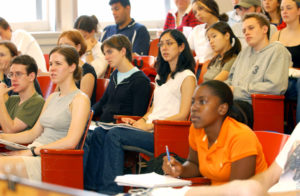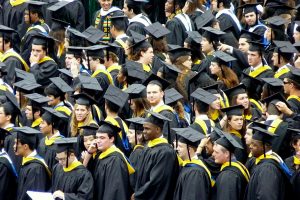Younger Americans are easily whipsawed by the changing winds of popular media, giving them less time or energy to navigate their own life course along the landmarks of the culture.
Add to the list of American institutions in crisis our public and private universities. The pandemic may be over, but growing challenges add to strains on students and staff to live up to the promise of advanced education and research. Student loan debt is an ongoing problem. Luckily, and after years of decline, states are starting to increase their support for higher education. The trick is to make it affordable and accessible to all who want it.
But I am focusing on two other challenges: a changed social environment that produces total distraction, and a public that has soured on colleges in general. Only about half of Americans have confidence in institutions of higher education. In a brief thumbnail sketch, let me explain, as one who has spent a lot of time in college classrooms.
The delayed adolescence we now accept has crept into the academy. The result is that fewer people attending institutions seem prepared to study or commit to being active learners. Too many still show up on campus to satisfy their parents more than themselves. One effect is more student mental health challenges. Many seem uncertain of what they want from an extended education. Most institutions have expanded on-campus access to professionals to help, focused on providing counseling and related services. Campus administrators especially encourage faculty to be alert to members of their classes that may be in crisis. Though still rare, suicides of students attending universities have dramatically increased. About 11 percent of the general student population report having thought about ending their lives.

Those who are enrolled typically read less and surf more. There are still plenty of learners who are happy to get lost in a book for hours at a time. But getting most students to read materials in support of classwork is a challenge, even in a “selective” institution. Whatever stigma that might have attached to being unprepared has diminished. In large classes a student can hide in the crowd, but even in small seminars I was impressed if I could get half of my class to focus on an assigned reading. It is obvious that the distractions of the outside world have invaded what was once a more cloistered model of higher education. Many are part time or live at home, with many other competing responsibilities. And social media absorb more of a student’s day, leaving less time or energy to become immersed in a single source for an extended period of time. This point has been made many times here and elsewhere. Indeed, chronic distraction now disables most of us. But it is nothing less than a disaster for the human species to succumb to media that baits us into endless rounds of trivial pursuit.

Narrow-minded vocationalism is gutting schools of what were once rich offerings in the arts and humanities. Courses and programs focused on ethics, the fine art, music, language, and history have lost ground. Parents are partly to blame, concerned that studying art history, music theory or non-fiction writing is a waste of time. They have misguided metrics of short-term results after graduation to argue that their charges should get a degree in accounting rather than American history. And fewer have any sense of what it means to get a “liberal education:” a phrase that means nothing less than the education of a free person. The result is that younger Americans are easily whipsawed by the changing winds of popular media, but unable to set their own life course through the landmarks of the culture. It is a loss for American civilization if important canons of film, music or literature are alien to students. This is happening at the very moment in their growth when they should be fired by the possibilities of intriguing cognitive challenges.

Tenure is under siege in favor of low wage faculty course contracts. Traditionally, tenure is a guarantee of freedom to those teachers and writers at the forefront of their fields. The promise of minimal interference from their home institutions guarantees that a state’s or institution’s ideological motives will not silence the professorate. This guarantee may seem insignificant to non-academics. But they would be wrong. When an institution undermines tenure, it also shifts the power to create new knowledge from the subject-matter experts –the faculty–to campus administrators or trustees who are usually out of touch with what is going on in a specific discipline. It made a positive difference in my 40+ years under its umbrella. To cite a familiar example, a parent or dean may not like idea of Critical Race Theory, but it’s important that a dedicated student be able to hear its impressive causality arguments.
![]()


